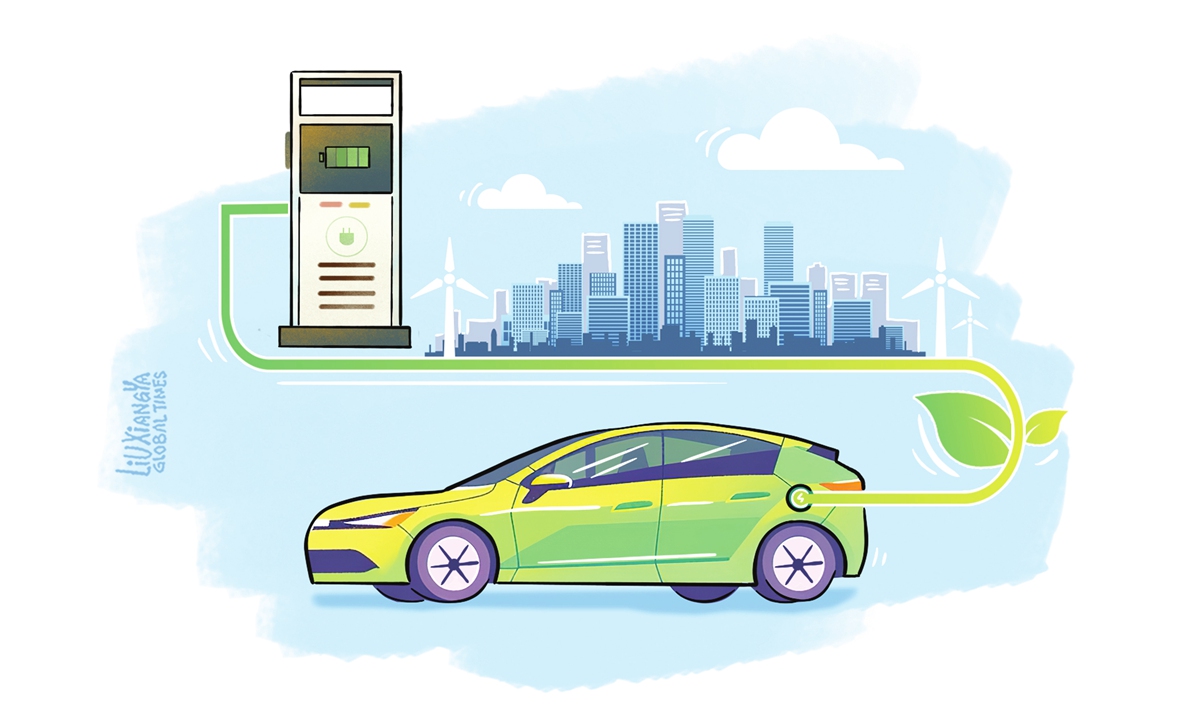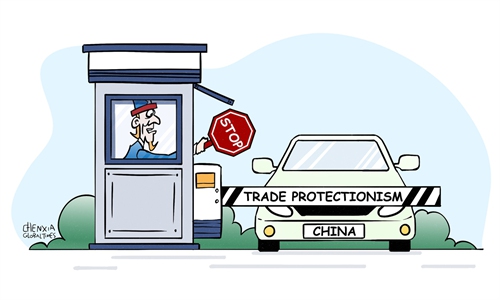
Illustration: Liu Xiangya/GT
While recent weeks seem to have been dominated by the stepped-up rhetoric of trade tensions and news about protectionist tariffs imposed by the US on electric vehicles (EVs) made in China, there's no doubt that China's new-energy manufacturing industries won't stop moving forward.
China's newly released plan to lift restrictions on purchases of new-energy vehicles (NEVs) could potentially unleash domestic demand and is therefore good news for the whole supply chain. It is an integral part of China's efforts in the areas of energy conservation and emissions reduction.
The State Council, China's cabinet, unveiled an action plan on Wednesday to cut carbon emissions in 2024 and 2025. Energy consumption per unit of GDP will decrease by about 2.5 percent in 2024, and carbon dioxide emissions per unit of GDP will fall 3.9 percent in the same period, according to the action plan.
In order to achieve these goals, many moves can be expected to further support the development of the new-energy manufacturing industries. This will inject new momentum into China's EV sector. For instance, the decarbonization action plan said China will accelerate the elimination of old motor vehicles and gradually lift restrictions on purchases of NEVs in various regions.
Such efforts are expected to boost NEV sales, shore up the development of the NEV industry and consolidate China's position as the world's largest EV market.
The widespread attention the news captured shows that lifting restrictions on purchases of NEVs went beyond market expectations. The stronger-than-expected measures demonstrate China's determination to boost the development of the new-energy manufacturing industries, which are essential for the decarbonization process. China won't offer the world mere empty promises to fight climate change. Practical efforts have been made to reduce carbon emissions.
China takes its carbon peak and carbon neutrality targets seriously. The country has included its timetable for peaking carbon dioxide emissions and achieving carbon neutrality into its national plan. It has become a practical action plan.
The direction of China's industrial restructuring is certain: the economy has shifted gear toward a green and low-carbon model. More specifically for the auto sector, China is expected to shift faster toward NEVs and gradually reduce the proportion of gasoline-guzzling vehicles. US trade protectionism cannot hinder China's efforts or development. The EV industry is sure to have a promising future.
Vehicle producers will need the foresight to continuously invest in NEV-related technologies and accelerate the electrification transformation. China has huge market potential, leaving room for the sustainable development of the EV industry. Foreign companies are welcome to invest in China's EV industry and share the economic dividends brought about by the decarbonization of the Chinese economy.
The decarbonization of the economy is a common issue for countries all over the world. The planet is on track to heat up at a much faster rate than scientists previously predicted. A host of countries have announced major commitments to significantly cut their carbon emissions. As the world's decarbonization pace grows, some new industries such as NEVs will emerge.
Those industries can only truly grow and get stronger through full competition. The world's common battle to develop those emerging industries, whether it ends in success or failure, is likely to have a profound impact on the global fight against climate change.
The US, as the world's largest cumulative emitter of greenhouse gases, should bear its responsibilities for climate change. However, the US has taken a wrong path, hindering the development of the new-energy and low-carbon industries, which is regrettable.
As reported by the New York Times, cars and other forms of transportation are, together, the largest single source of carbon emissions generated by the US. It's ironic that American political elites call on other countries to accelerate their plans to reduce greenhouse gas emissions, but, in the meantime, use protectionist measures to shield obsolete US production capacity from fierce competition from Chinese companies. This will hinder the development of new-energy industries.
We sincerely hope that countries all over the world will not join the US in its protectionist actions, but instead contribute to the development of the world's new-energy industries and global efforts to reduce emissions.
The author is a reporter with the Global Times. bizopinion@globaltimes.com.cn



